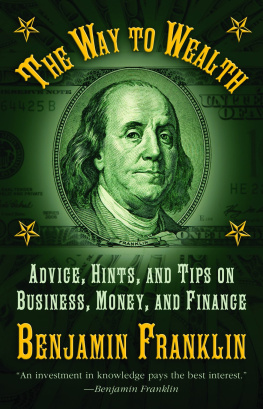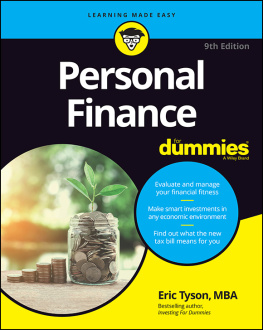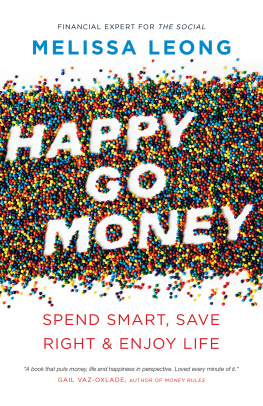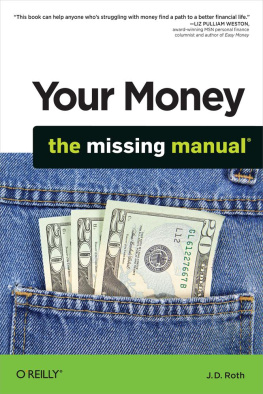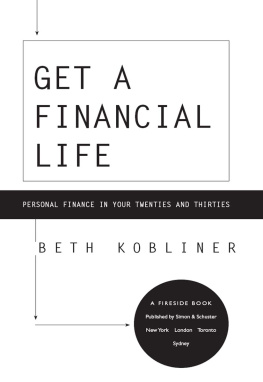Copyright 2013 by Ellen Roseman
All rights reserved. No part of this work covered by the copyright herein may be reproduced or used in any form or by any meansgraphic, electronic or mechanicalwithout the prior written permission of the publisher. Any request for photocopying, recording, taping or information storage and retrieval systems of any part of this book shall be directed in writing to The Canadian Copyright Licensing Agency (Access Copyright). For an Access Copyright license, visit www.accesscopyright.ca or call toll free 1-800-893-5777. For more information about Wiley products visit www.wiley.com .
Care has been taken to trace ownership of copyright material contained in this book. The publisher will gladly receive any information that will enable them to rectify any reference or credit line in subsequent editions.
The material in this publication is provided for information purposes only. Laws, regulations, and procedures are constantly changing, and the examples given are intended to be general guidelines only. This book is sold with the understanding that neither the author nor the publisher is engaged in rendering professional advice. It is strongly recommended that legal, accounting, tax, financial, insurance, and other advice or assistance be obtained before acting on any information contained in this book. If such advice or other assistance is required, the personal services of a competent professional should be sought.
Library and Archives Canada Cataloguing in Publication Data
Roseman, Ellen, 1947
Fight back : 81 Ways to Help You Save Money and Protect Yourself from Corporate Trickery / Ellen Roseman.
Includes index.
Issued also in electronic formats.
ISBN 978-1-11830-088-6
1. Finance, PersonalCanada. I. Title.
HG179.R672 2012 332.02400971 C2012-906764-4
ISBN 978-1-118-30148-7 (eBk); 978-1-118-30149-4 (eBk); 978-1-118-30150-0 (eBk)
Production Credits
Cover design: Adrian So
Typesetter: Thomson Digital
John Wiley & Sons Canada, Ltd.
6045 Freemont Blvd.
Mississauga, Ontario
L5R 4J3
To my Toronto Star editors for giving me the freedom to advocate for consumers; to my readers for giving me their stories and support; and to my family (Edward, Charles and Richard) for giving me the strength to keep up the fight.
To my literary agent, Brian Wood, for encouraging me to write about fighting back; and to my guest contributors for adding their diverse voices and informed advice to the book.
Foreword
By Dave Chilton
I Love Ellen Roseman's Writing.
So much so, I actually pushed her to write the book you're holding. Then I had the nerve to ask to write the foreword (and I normally hate writing forewords!).
Why am I such a big fan of Ellen?
Quite simply because she helps people learn financial planning's most important skill: saving money. Personal-finance educators from Ben Franklin to the Wealthy Barber have preached, Spend less than you make. Fine advice, indeed. But Ellen takes it a key step further by adding... and here's how.
This book, a truly amazing reference, will teach you how to negotiate better prices and contracts, know your rights (and companies' wrongs!) and make wise spending decisions.
Yes, I sound like an infomercial, but this book will truly pay for itself hundreds of times over. So, act now! Don't delay! Get reading!
And, keep it in a handy placeyou'll refer back to it many times. I have already.
Dave Chilton
aka The Wealthy Barber
Introduction
My First Book, Consumer, Beware! , came out in 1974. And guess what? It was defective. The perfect binding (actually glue) separated from the pages, causing them to fall out in clumps.
This was embarrassing, as you can imagine. It was also funny to read the letters from unhappy buyers: I have never written a complaint before, but following the template you gave on page X, I want to ask for my money back.
The publisher, alas, was insolvent and had not paid the binder. But when it was bought by a bigger publisher, I asked the CEO for help. He recalled the books from the stores, rebound them and added a cover that said, New and improved.
That was my first taste of consumer activism. I succeeded in forcing an unsafe product off the shelves. Meanwhile, the readers who had the courage to complain received a replacement book. Those who did nothing lost out.
As a newspaper columnist, I am attracted to those who shake things up. Even when I veered into financial journalism, I found fertile ground for consumer activism in the mutual fund industry. Many companies treated investment advisers as their customers, while ignoring the needs of investors. That is no longer true.
I spend much of my time trying to help people with problems. There is a double standard in Canada. I call it two-tier service. Most businesses pay little attention to customers after the sale. They cut costs by outsourcing and making you wait on the phone. They send you boilerplate letters that say nothing.
In this book, I give you my best tricks for fighting back in areas where you spend lots of time and money (such as banking, telecommunications, travel and retail). I enlist advice from my best journalistic sources.
Here is my top tip: Your loyalty is valuable. Do not give it away. Tell your service suppliers how long you have been loyal to them. You helped build their brands. You recommended them to others. Without you, they cannot grow as quickly.
Be steadfast. Take nothing for granted. Keep up the fight. When a company says no, take it to the media. Use the courts.
Victory goes to those who are stubborn and persistent. You can get a better deal. You can fight back.
Part 1
Outsmarting the Banks
As Canadians, we love the convenience and personal service we get at the big banks. We know our banks did a solid job during the recession and stock market crash in 2008-2009. They withstood the stresses that sunk some financial institutions in the U.S. and overseas. We're proud of their strength and conservative lending practices.
But there are many things we don't like about the big banks. They can make us so annoyed that we head off to smaller financial institutions, hoping to find a more caring attitude and more respect for customers.
Why do banks keep increasing their service charges and adding new charges, despite making billion-dollar profits? Why do they impose fees on products and services we already own without asking for permission or even notifying us?
Suppose you're moving your registered retirement savings plan from one bank to another. You may not see the fees that your bank charges to transfer the investments elsewhere until after doing the paperwork. These fees may not even have existed when you opened your RRSP.
Why do banks play games with interest rates? They often post rates that apply only to customers who don't make an effort to negotiate a better deal. It would be nice if they gave us their best rates right away and didn't force us to grovel.
These fictitious posted rates can come back to haunt you if you make an early exit from a closed mortgage in order to sell or refinance. Banks often calculate the penalty using the higher rate you didn't have to pay, rather than the discounted rate you actually did pay.
Why do banks offer such a dizzying array of credit cards? You can easily get confused, trying to pick the best card for your needs and juggling the competing demands of interest rates, service charges, annual fees, warranties, cash back and travel or merchandise rewards.
Finally, why do banks try so hard to sell you insurance to protect your credit card balance if you get sick or lose your job? They used to do it in a sneaky way, adding it to your account and making you responsible to cancel it. Now the law has changed to outlaw such negative option billing. But some cardholders still say yes to telephone pitches for insurance, not knowing that it pays only the minimum balance each month and costs too much for the benefits that it offers.


